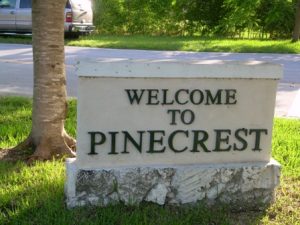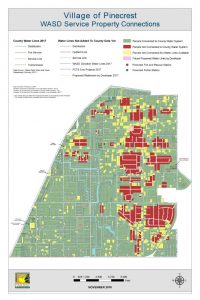Voters in Pinecrest have been asked to decide by next week whether the village should issue $15 million in bonds — the largest in the village’s short history — to provide access to the last 739 properties that do not have Miami-Dade drinking water and add fire hydrants.
If the referendum passes — it’s a mail-in ballots only election and they are due  March 26 — property owners will have to pay an additional 23 cents per $1,000 of taxable value every year. The average homeowner would pay about $158 more a year — or a month’s worth of Starbuck’s. Of course, there are homes that will pay much more than that. Over the next 20 years, the average homeowner will pay a total of $3,160 to fund the completion of the Miami-Dade Water and Sewer infrastructure in the village, approximately 18.5 miles (98,000 linear feet) of waterline, and add 208 fire hydrants to village streets.
March 26 — property owners will have to pay an additional 23 cents per $1,000 of taxable value every year. The average homeowner would pay about $158 more a year — or a month’s worth of Starbuck’s. Of course, there are homes that will pay much more than that. Over the next 20 years, the average homeowner will pay a total of $3,160 to fund the completion of the Miami-Dade Water and Sewer infrastructure in the village, approximately 18.5 miles (98,000 linear feet) of waterline, and add 208 fire hydrants to village streets.
The fire hydrants will be added because the work is being done — not because they are needed. Miami-Dade Fire Rescue has repeatedly told Pinecrest that they have plenty water capacity to handle any fire in the village.
But proponents of the hookup — which include former and current electeds — are using that to scare people into voting yes.
Read related: More money, less scrutiny, in Miami-Dade water projects
Hooking up to county water has been a big Pinecrest issue since even before incorporation in 1996. “It has been one of our top priorities over th e years, and we have made significant progress on completing this system,” said Mayor Joe Corradino.
e years, and we have made significant progress on completing this system,” said Mayor Joe Corradino.
“Over the past 22 years the idea of going to referendum has been discussed but not acted upon,” Corradino said in a online message to residents on the city’s website page dedicated to the water vote. “Our Village Charter allows a referendum. Today we have never been closer to completing this project. The number of homes and the total cost are such that we can hold this referendum.”
Back then, there were about 1,500 properties that relied on wells rather than county water. The 2004 countywide Building Better Communities bond referendum supplied Pinecrest with $4.3 million for the water system. The Village also got a Florida state grant of $1.5 million for the infrastructure up to the sidewalk. The $5.8 million paid for infrastructure up to the sidewalk completed about 10 years ago, said City Manager Yocie Galiano, calling that Phase I and Phase II of the water system. Property owners still had to pay for the service hook-up connection from the public right of way to their homes/buildings, she said.

Galiano said only 535 or so homes were hooked up as part of Phase I and Phase II. Then the county money ran out. Another 200 or so were homes or properties that were redeveloped or for whatever reason and paid out of pocket to hook up on their own, almost one by one. The 739 homeowners who remain did not want, at that time, to pay an assessment to finish the job.
Miami-Dade County policy dictates that the cost associated with new water infrastructure be borne by private developers/private property owners. Revenue from the sale of water to existing customers can only be used to fund expenditures and improvements to the existing infrastructure, not new infrastructure — not unless they can cover it with “economic development” like the megamall in Northwest Dade.
After some lobbying for years by a group of the affected homeowners, the village council voted to put the referendum on the ballot in January. It was a 4-1 vote, with Councilman James McDonald dissenting. In an op-ed in Community Newspapers, McDonald wrote that it was unfair to saddle the entire town with a 20-year tax on something they will not reap benefits from.
“Once these water lines are built they will be turned over to Miami-Dade  County for the county to derive all the revenue. Pinecrest gets nothing but debt for 20 years,” he said. “From my perspective, it is not fiscally responsible to do this to incur the largest bond debt ever in Pinecrest’s history and then give the infrastructure we build to Miami-Dade County.
County for the county to derive all the revenue. Pinecrest gets nothing but debt for 20 years,” he said. “From my perspective, it is not fiscally responsible to do this to incur the largest bond debt ever in Pinecrest’s history and then give the infrastructure we build to Miami-Dade County.
“Pinecrest will not own the water lines nor will it get the revenue stream from the users to finance the bond,” McDonald wrote. “It is simply not appropriate to saddle the entire village with a debt that will only benefit 740 parcels and where Miami-Dade county will receive the revenues.”
McDonald said he can think of plenty of other things that more village residents would prefer spending that kind of money on — parks, a gymnasium, maybe — and then there’s the nagging little fact that it does nothing about the fact that 95% of the village has septic tanks, a growing sea level rise issue.
If the infrastructure was funded via a special taxing district of only the 739 property owners affected, that would cost an average of about $20,000 over 20 years, city administrators said. It would be $1,500 annually, not $150.
Still, some property owners don’t care if it’s not their problem: They don’t want to pay for their neighbors’ upgrades.
“While I fully realize the issue at stake, I just cannot seem to grasp the concept  of making every Pinecrest property owner (whether it be a home or vacant land) for an issue belonging to just 750 homes,” wrote Francisco Mehech in a letter to the editor in the Pinecrest Tribune. He owns four properties and just sold a property that he had to personally pay the hookups for, he said.
of making every Pinecrest property owner (whether it be a home or vacant land) for an issue belonging to just 750 homes,” wrote Francisco Mehech in a letter to the editor in the Pinecrest Tribune. He owns four properties and just sold a property that he had to personally pay the hookups for, he said.
“It just doesn’t seem fair to place the burden of these select few into the pocketbooks of the many other property owner and/or residents in the Village,” Mehech wrote, adding that he is a no.
But there is no organized opposition. And there is organized advocacy.
Proponents have formed a political action committee called Pinecrest H2O, with former Councilwoman  Cheri Ball as treasurer, to push the yes vote. It is unfortunate that some of these advocates — who include former mayor Evelyn Greer and Cindy Lerner — seem to be focused primarily on the fire safety part, which is smart because that is how you get the referendum passed. A 45-second web video talks about missing 208 fire hydrants and 2,500 people “without fire protection” — which is not entirely true — and does not give one word about providing a connection to county water for 739 private properties. At least half the post on their three-week-old Facebook page are about “public safety.”
Cheri Ball as treasurer, to push the yes vote. It is unfortunate that some of these advocates — who include former mayor Evelyn Greer and Cindy Lerner — seem to be focused primarily on the fire safety part, which is smart because that is how you get the referendum passed. A 45-second web video talks about missing 208 fire hydrants and 2,500 people “without fire protection” — which is not entirely true — and does not give one word about providing a connection to county water for 739 private properties. At least half the post on their three-week-old Facebook page are about “public safety.”
Corradino said that while the village will “facilitate this referendum,” the village cannot, by law, advocate for a yes or no vote. Except it sure seems they have their fingers crossed.
The web page features a colorful, upbeat image of the word “Inspire” and the village undertook an aggressive “get out the vote campaign” that included eight — count ’em, eight; two per week, including the last one this past Saturday — public workshops for residents and property owners to learn about the project and see the map. The village slapped posters in public spaces and sent postcards to all registered voters and a letter from the administration explaining what the financial  impact would be.
impact would be.
They got one of those FDOT-like signs with the blinking lights to remind folks to vote — and they hired a guy with a spinning sign on U.S. 1.
“We are doing everything we can to get the vote out,” Galiano said.
It’s apparently working. The Miami-Dade Elections Department reports that as of Tuesday, 3,948 ballots had been returned from the 13,300 mailed to voters. That represents a turnout so far of practically 30%.
“In over two decades we have never been closer to bringing this issue to a conclusion,” Corradino said. And we’ll know next week.
Unless, of course, there’s a lawsuit.

